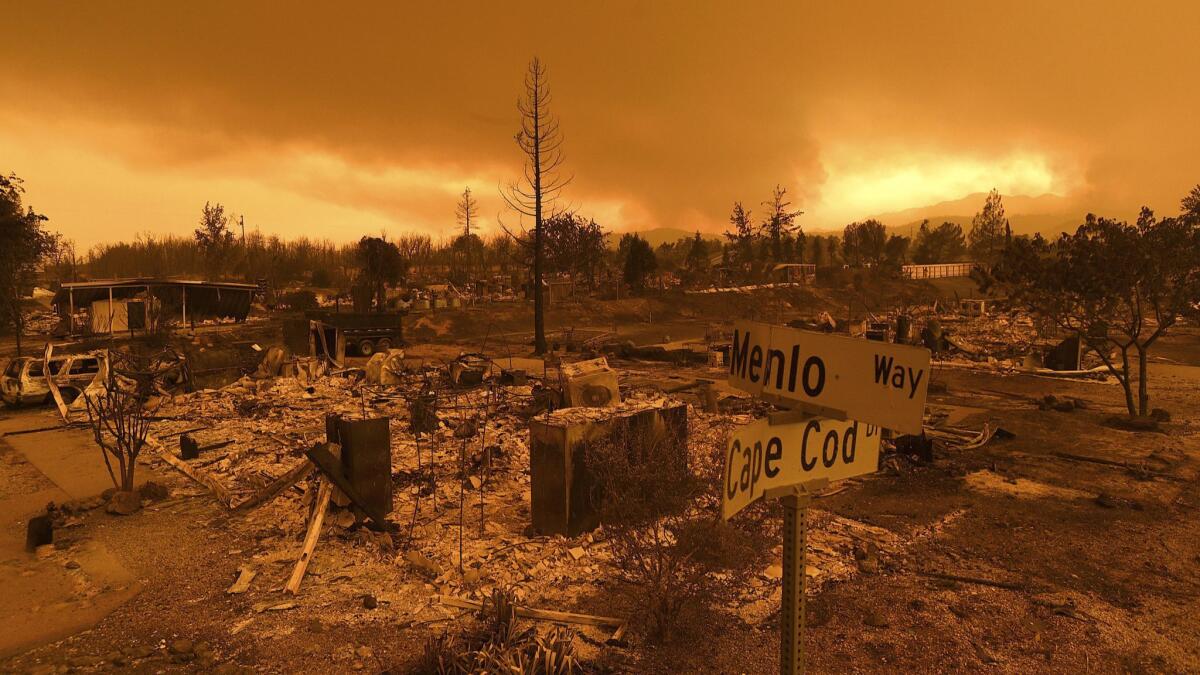Capitol Journal: California lawmakers are finally starting to see the light through the soot

- Share via
Reporting from Sacramento — Skies have been sooty over the state Capitol for weeks, soiled by Northern California wildfires. It’s a daily reminder for legislators and Gov. Jerry Brown about what their top priority should be.
It’s to enact laws that vastly improve California’s ability to prevent wildfires, and to douse them before they roar out of control.
Government’s No. 1 responsibility, after all, is public safety.
From The Times news bureau on the 17th floor of an office building near the Capitol, one normally can clearly see intriguing Mount Diablo 54 miles to the southwest. But we haven’t spotted it since mid-July because a dirty blanket of smoke has covered everything between us and the San Francisco Bay Area.
So far this year, wildfires have blackened 1.1 million acres in the state, according to the California Department of Forestry and Fire Protection. A hellish Mendocino Complex fire burned across four counties and became the largest in state history, charring 422,000 acres.
Wildfires this year have destroyed or damaged nearly 2,200 structures, mostly homes, and killed at least 12 people.
And we haven’t even reached what traditionally has been California’s peak fire season, September and October, when devilish Santa Ana winds whip up blazes that scorch the Southland.
Fire season has become almost year-round in California, we’re told by experts. They say this will be the “new normal” because of global warming, aggravated by the recent four-year drought that parched woodlands and turned vegetation into kindling.
Therefore the Legislature needs to pass bills that substantially improve California’s fire prevention and firefighting capabilities beyond modest steps taken in the current state budget. Lawmakers and the governor have been working on it, but are still debating.
Now time is running out. They face a Friday midnight deadline for adjournment of the two-year legislative session.
“The expectation is that we’re going to have legislation that’s meaningful and productive,” says Sen. Hannah-Beth Jackson (D-Santa Barbara), who sits on a two-house conference committee that is writing the Legislature’s centerpiece bill. “Everyone wants to see this happen.”
For Jackson it’s personal, as it is with several legislators touched by fire. December’s Thomas fire, which until this summer was the largest in state history, stopped one mile short of her Santa Barbara home.
“We were evacuated for six days,” she recalls. “We breathed smoke for 40 days. I had trouble breathing. It took quite a lot of time to be able to breathe normally.”
Jackson has four bills awaiting action on the Assembly floor.
One would allow homeowners and businesses to use property tax payments to finance replacement of fire hazards such as wood shingle roofs. People already can do that to pay for energy or water efficiency upgrades.
Another measure would assure that homeowner insurance policies cover mudslides, such as the ones that devastated Montecito after the Thomas fire.
Jackson also has a bill to prod federal, state and local agencies into closer cooperation on forest management. And one of her proposals would allow counties to automatically enroll all residents in a mobile phone emergency alert program. Now people must voluntarily sign up.
Sen. Mike McGuire (D-Healdsburg), whose district was charred last year by the wine country fires, has a bill on the Assembly floor to require a statewide, uniform alert system to warn citizens of rampaging wildfires. He’d use not only cellphones, but landlines, television, radio and electronic billboards — like Amber Alerts.
“We have the technology,” McGuire says. “Now we need the will to get this legislation passed. We still have some fight in front of us.”
Coverage of California politics »
The Legislature’s big bill — its most comprehensive — is the conference committee’s product. A co-chairman is Sen. Bill Dodd (D-Napa), another wine country lawmaker who is under hometown pressure to produce. On Friday, he proposed an outline of legislation.
For weeks the committee has focused on private utilities’ efforts to reduce financial liability when fires are ignited by their equipment, such as falling power lines. The utilities finally gave up, but Dodd’s proposal offered a little help.
Under the plan, the California Public Utilities Commission could allow a utility to raise customer rates to repay long-term bonds sold to finance liabilities from a catastrophic wildfire.
Dodd and committee members asserted they empathized with ratepayers, but needed to protect utilities from bankruptcy. Pacific Gas & Electric Co. has warned it could go bankrupt because of billions of dollars in wildfire liabilities.
“We want to protect ratepayers, but we don’t want the utilities to go broke,” Assemblyman Chad Mayes (R-Yucca Valley) said. “There’s a balance.”
Lawmakers repeatedly insisted they weren’t “bailing out” the utilities. But ratepayer interests weren’t buying it.
“This looks like a bailout, smells like a bailout and certainly feels like a bailout,” Michael Shaw of the California Manufacturers and Technology Assn. told the committee.
The proposed legislation has a lot of other meat in it.
There’s regulatory streamlining for landowners who want to remove dead trees and flammable underbrush. There’s also financial incentives for burning wood waste in biomass energy plants.
The state would spend $250 million annually from its greenhouse gas reduction fund for forest management.
And there’s money to more quickly move firefighters, helicopters and other equipment into blazes when they first erupt in an effort to douse them early.
Legislators will probably pass some modestly significant stuff.
They’re starting to see the light through the soot.
Follow @LATimesSkelton on Twitter
More to Read
Get the L.A. Times Politics newsletter
Deeply reported insights into legislation, politics and policy from Sacramento, Washington and beyond. In your inbox twice per week.
You may occasionally receive promotional content from the Los Angeles Times.











